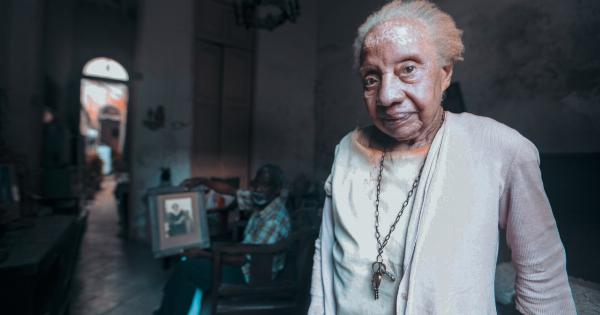As individuals age, it is common for various aspects of their lives to undergo changes. One such area that often experiences a transforming shift is sexuality.
Contrary to popular belief, the desire for intimacy and sexual activity does not diminish solely due to age. However, numerous factors contribute to a decline in sexual desire among seniors. This article explores the reasons behind dwindling senior sexuality and offers insights into managing and enhancing sexual experiences in later years.
The Physiological Basis of Senior Sexuality
Before delving into the reasons for diminished sexual desire in seniors, it is crucial to understand the physiological changes that occur with age. As the body ages, both men and women experience hormonal shifts.
In women, the onset of menopause leads to decreased estrogen levels, resulting in vaginal dryness and reduced libido. In men, the gradual decline in testosterone levels can lead to erectile dysfunction and lower sexual stamina.
Psychological Factors Influencing Senior Sexuality
While physiological changes play a role in senior sexuality, the impact of psychological factors should not be underestimated.
The challenges of aging, such as the loss of a partner or health issues, can significantly affect the psychological well-being of seniors. Feelings of grief, anxiety, depression, or stress can dampen sexual desire and hinder the ability to engage in intimate relationships.
Additionally, body image concerns and self-confidence issues may arise, making seniors feel less desirable or capable of engaging in sexual activities.
The Role of Medications and Health Conditions
Many health conditions common among older adults can contribute to a decline in sexual desire. Chronic illnesses such as diabetes, heart disease, and arthritis can cause fatigue, pain, and discomfort, making sexual activity less appealing.
Furthermore, numerous medications used to manage these conditions, including blood pressure medications and antidepressants, often have side effects that impact sexual function and desire.
Relationship Dynamics and Intimacy
The quality of the relationship plays a vital role in sustaining a healthy and fulfilling sexual life in later years. Issues such as communication problems, unresolved conflicts, or a lack of emotional intimacy can negatively impact senior sexuality.
Additionally, societal and cultural norms surrounding aging and sexuality may create barriers that discourage open discussions about sexual needs and desires. These factors can lead to a decline in sexual activity among seniors.
Social Stigma and Lack of Education
One major obstacle affecting senior sexuality is the presence of social stigmas and taboos surrounding sex in older adults. Society often perpetuates the notion that seniors should no longer have sexual desires or engage in sexual activities.
This lack of acceptance and understanding can result in seniors feeling ashamed or embarrassed about their sexual needs, causing them to suppress their desires and leading to a decline in overall sexual satisfaction.
In addition, there is often a lack of comprehensive sexual education targeted specifically towards older adults. Many individuals grew up during a time when sex education was either limited or nonexistent.
This lack of knowledge about sexual health and aging can perpetuate myths and misconceptions, creating barriers to exploring and maintaining a healthy sexual life in later years.
Managing and Enhancing Senior Sexuality
While senior sexuality may face challenges, it is essential to recognize that a fulfilling and enjoyable sexual life is possible at any age. Below are strategies that can help seniors manage and enhance their sexuality:.
1. Open Communication
Engaging in open and honest communication with a partner is key to maintaining intimacy and addressing any concerns or challenges that arise.
Discussing desires, needs, and expectations can help couples navigate changes in their sexual relationship and find new ways to experience pleasure.
2. Seeking Professional Help
If physical or mental health issues are impacting sexual desire, seeking professional help is crucial.
Healthcare providers, including physicians, therapists, or sex therapists, can offer guidance, address underlying medical conditions, and provide strategies to improve sexual functioning.
3. Exploring Non-Sexual Intimacy
Engaging in non-sexual forms of intimacy, such as cuddling, hugging, or holding hands, can foster emotional closeness and maintain a sense of physical connection, even if sexual desire is diminished.
Enjoying each other’s company and finding pleasure in non-sexual activities can help sustain the bond between partners.
4. Prioritizing Self-Care
Taking care of one’s physical and mental well-being is essential for maintaining a healthy sexual life. This includes engaging in regular exercise to promote blood flow, eating a balanced diet, managing stress levels, and getting enough rest.
By prioritizing self-care, seniors can improve their overall vitality and sexual function.
5. Educating Oneself
Seeking out comprehensive sexual education materials designed for older adults can help dispel myths and misconceptions surrounding senior sexuality.
Understanding the normal physiological changes and addressing any concerns with accurate information can empower seniors to embrace and enjoy their sexuality.
6. Introducing Sensual and Sexual Enhancements
Exploring various sexual aids and enhancers designed for older adults can be beneficial in enhancing sexual experiences.
Lubricants can address issues of vaginal dryness, while devices such as vibrators or erectile aids can assist in pleasure and maintaining sexual function. Seniors should feel empowered to experiment and find what works best for them.
7. Joining Supportive Communities
Engaging with supportive communities or organizations that focus on senior sexuality can offer a sense of belonging and provide a platform for open discussions.
Connecting with peers who share similar experiences can be validating and alleviate feelings of isolation or shame.
8. Redefining Sexual Intimacy
Sexual intimacy does not have a one-size-fits-all definition. Seniors should feel empowered to redefine what intimacy means to them and strive for experiences that bring them pleasure and fulfillment.
Moving beyond societal expectations and embracing individual desires can lead to a more satisfying sexual life.
Conclusion
While it is true that sexual desire may dwindle with age due to various physiological, psychological, and societal factors, it does not mean that seniors should resign themselves to a lackluster or non-existent sexual life.
By understanding the underlying reasons for diminished senior sexuality and implementing strategies to manage and enhance sexual experiences, seniors can continue to enjoy a fulfilling and pleasurable intimate life well into their golden years.






























